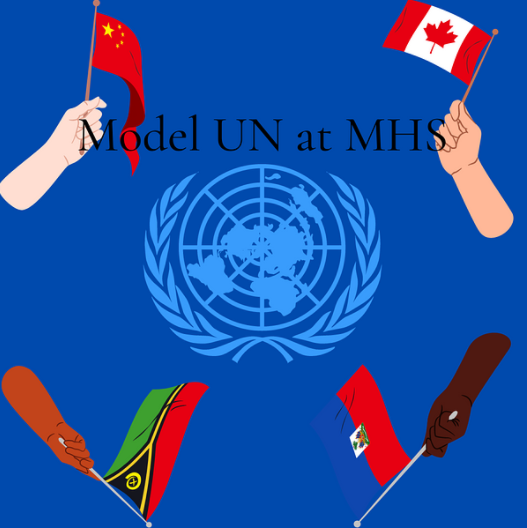

After two years, Model UN has returned to Malden High School and both teachers and students were excited.
This year, simulations were held in the gallery and the library at MHS. In total, over 300 juniors and seniors participated in the simulations. There were five different simulations, each with 60 to 70 students representing 25-35 countries.
Each year, the students are assigned a global issue that needs to be solved. This year, the issue was fair educational access in a post-COVID-19 world. The students formed groups to represent a nation, many of which were European, African or Asian.
History teacher Haley Mallett explained that the department already had a good understanding of how the United Nations works because it is “such a critical and central topic to modern world history, to figure out how these countries stood on the issues and take on that role to bring to the floor of a mock United Nations.” As a result, they spent roughly a month researching, writing and practicing speeches in class.
Jessie Belfer, another history teacher, said, “the MHS Social Studies department works together with the United Nations Association of Greater Boston (UNAGB) to pick a topic for each year’s Model UN Simulation and set dates when UNAGB staff members can come into our school to lead simulations for Modern World History classes.”
Mallett expressed that some students were really interested in Model UN and others not as much, which was to be expected. “There were definitely more students who were engaged and not, for example, part of the simulation. Eventually, countries get to start passing notes to each other, kind of secretly. So I can definitely tell there were more students who were interested in engaging in the process fully than others. But everyone was engaged in some way more or less.”
Prior to COVID, a multi-school simulation would be hosted at Northeastern University. Malden High School, along with a number of other high schools in the region, would send a group of students to Northeastern University to participate in the full-fledged Model UN simulation. However, it was a virtual event this year. The school had around 30 students elected to participate in the virtual conference for additional credit, and they were able to interact with students from different schools across the state, with several MHS students winning awards for their participation.
“My favorite part of the simulation was the final stage where students worked together to draft resolutions. They did a great job bringing their assigned countries’ interests into the resolution writing process and collaborating with students from other classes,” Belfer said.
Overall, the simulations went great. The students gave opening remarks for their own nations, debated educational inequalities throughout the world and collaborated to create UN-style resolutions to solve the global community’s concerns.




